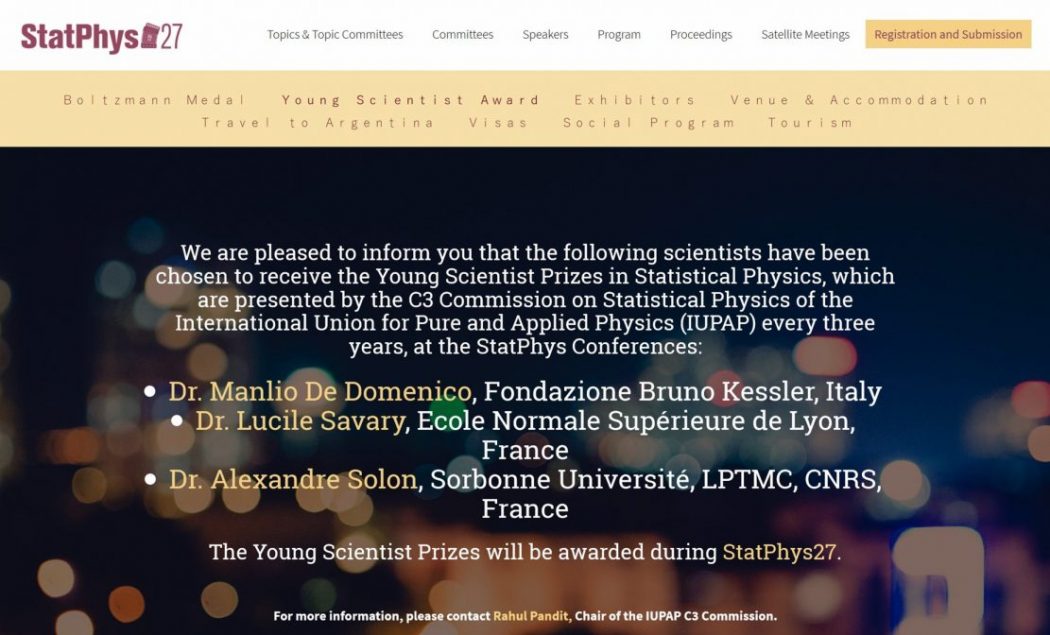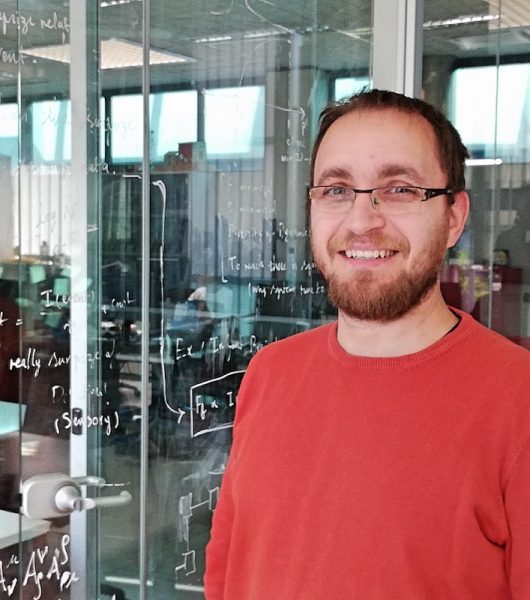FBK Researcher in the Olympus of Young Researchers in Physics
Manlio De Domenico wins the prestigious Young Researchers in Statistical Physics Award (IUPAP-C3, 2017) for the many interdisciplinary applications of his research in Statistical Physics. Complexity feels at home now among physicists
You don’t need something more to get something more. That’s what emergence means *
Murray Gell-Mann, Nobel Prize in Physics (1969)
for introducing quarks, one of two fundamental ingredients for all matter in the universe.
What do GPS, laser, and molecular medicine have in common?
These are all unexpected effects but very useful of Albert Einstein’s contributions – they go to General Relativity, Quantum Mechanics and Statistical Mechanics – published at the end of 1915, at the base of the most successful theories in the history of science.
Most likely, the great scientist did not think that his intuitions could lead to these uses, but we can say with certainty that among what guided him there was an idea of beauty understood as a fundamental criterion for choosing the best theory.
We all know how his thoughts subsequently exercised a wide range influence on the study of physics, so much so that we could attribute the nature of real revolution to his cultural innovation.
This major transformation has concerned general relativity, introduced quantum mechanics and questioned statistical physics.
Statistical physics is a fundamental theory of physics that uses statistical methods to solve physical problems.
The International Union of Pure and Applied Physics (IUPAP) was founded in 1922 in Brussels with 13 member countries and the first General Assembly was held in Paris in 1923. The objectives of the Union are:
- to stimulate and promote international cooperation in physics;
- sponsor appropriate international meetings and provide support to organizational committees;
- promote the preparation and publication of abstracts of maps and tables of physical constants;
- promote international agreements on other uses of symbols, units, nomenclature and standards;
- to foster the free mobility of scientists;
- encourage research and education.
The Young Researchers Award in Statistical Physics was recently established by UPAP’s C3 Commission on Statistical Physics . The award aims to recognize the outstanding achievements in statistical physics of scientists in the early stages of their careers. Recipients must have no more than eight years of research doctorate as pf July 1, 2016 and are expected to have shown significant results and outstanding promises for future results in the field of experimental or theoretical statistical physics. The prize consists of a certificate that lists the recipient’s contributions, a medal and 1000 euros.
The three winners of the last edition have been recently announced: among the 3 most brilliant scholars under 40 in the world of this disciplinary field there is also our researcher Manlio De Domenico.

The news marks an important new element since it introduces the topic and the methodological approaches of complexity to the VIPs of contemporary physics.
The fact that the theory of complex networks is formally accredited as part of statistical physics can open up new applicative scenarios for all scientific investigations that study (through) interdisciplinarity. Going beyond the typical uncertainties of the microscopic scale that would require enormous computing power, we have the possibility of observing unexpected overall behaviors, on a macroscopic scale, including emerging properties and characteristics: from the origin of life to consciousness. Paraphrasing, and with a leap back in time, the old Aristotelian adage comes to mind: “the whole is greater than the parts”; Similar considerations, a century ago, were the basis of Gestalt, a psychological current focused on the themes of perception and experience, applied in architecture and other fields.
The Young Scientist Prize in Statistical Physics is considered the equivalent for the young people of the Boltzmann Medal, the largest recognition in the world for Statistical Physics, after the Nobel Prize.
The award ceremony of the international award will take place during the StatPhys27 conference, which will be held in Buenos Aires, Argentina, July 8 through 12, 2019.
Congratulations Manlio!
* Life can emerge from physics and chemistry plus a lot of accidents. The human mind can arise from neurobiology and a lot of accidents, the way the chemical bond arises from physics and certain accidents. Doesn’t diminish the importance of these subjects to know they follow from more fundamental things plus accidents.

